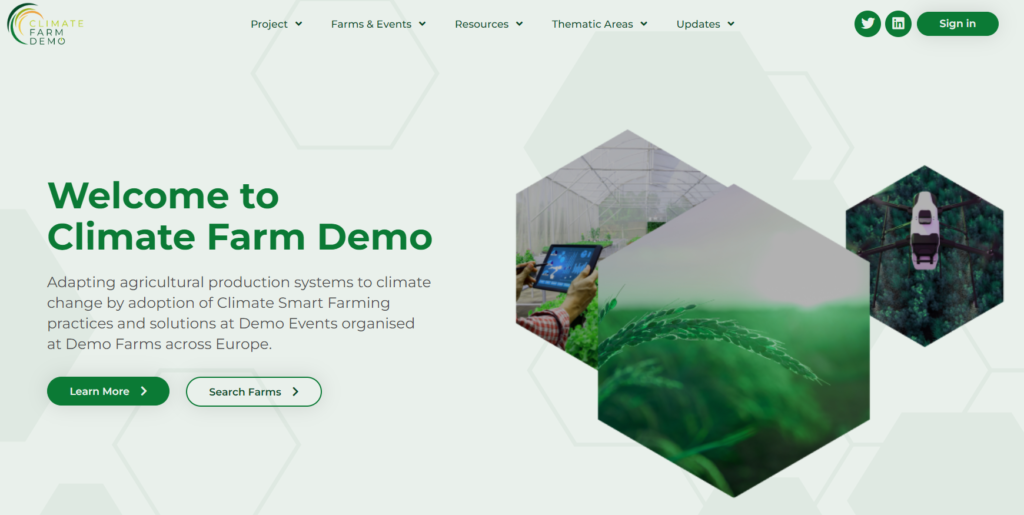This innovative initiative exemplifies the power of collaboration in addressing climate challenges while advancing sustainable farming practices.
The Challenge
The Living Lab is tackling two major goals: reducing greenhouse gas (GHG) emissions and increasing soil organic matter (SOM). By leveraging the potential of biogas production, the initiative aims to foster resource efficiency and significantly lower the environmental footprint of farming.
The Climate-Smart Farming Solution
Biogas Västra Skaraborg focuses on establishing and operating a farmer-owned biogas plant. Around 100 farmers are shareholders in the initiative, with most contributing manure from their farms to the plant. This cooperative model overcomes challenges such as equitable profit distribution and digestate allocation while enabling more efficient operations compared to smaller, individual plants.
Biogas production offers a dual benefit: converting manure into renewable energy and returning nutrient-rich digestate to the soil. This not only reduces GHG emissions but also promotes a circular economy, essential for achieving broader climate goals.
Partners Involved
The project is supported by Agroväst Livsmedel AB (AGROV), with insights shared by Kristina Anderback, who has been deeply involved in the Living Lab.
Interview with Kristina Anderback, Agroväst
What were your first impressions of the Living Lab and your initial expectations?
My first impression was that I was impressed by the foresight, courage and perseverance of the farmers who took on the role of driving and coordinating the work to achieve the vision of a farmer-owned biogas plant in western Skaraborg. They could have chosen a much simpler solution, by inviting a major industrial player to become an owner and take on the investment and responsibility for future operation. But this group rose to the challenge to find a way to keep the whole business with the farmers.
The association had done a fantastic amount of anchoring work before joining CFD as one of ten Living Labs. Almost 100 farmers joined the non-profit organisation Biogas Västra Skaraborg in 2021, and in the spring of 2022, around 80 farmers decided to become owners of the limited company that was formed to own and operate the future biogas plant.
My initial expectation was that they would probably succeed in getting a biogas plant in a place that received manure from farmers’ farms and processed it. But I didn’t feel as confident that they would succeed in setting up a farmer-owned plant, with the huge amount of labour required in an area where they don’t have the knowledge, experience, and networks themselves.
Are the plans realistic and achievable? Why?
Yes, I think so. They have done a thorough job of getting nearly 100 farmers to invest in the limited company that will build, own, and operate the plant. Some are involved because they see it as a good deal. Some because it is fun and interesting. And others because it feels right to join from a climate and environmental perspective.
They have managed to produce the necessary documentation in terms of location, planning documents, business plan, environmental impact assessments, nutrient balances for the biofertilizer, and calculations for the plant. And earlier this autumn all the permits required to start building the plant were completed. This year they were also granted support from the Swedish Environmental Protection Agency for the investment. So now they are planning to start building and to get the logistics and infection control in place on the farms.
What insights have you gained so far through the Living Lab and this project?
It takes not only capital but also courage, a strong will and a great deal of patience to realise a project like this. Everything takes time and requires a lot of effort.
It also requires trust and a high level of social capital. The board members of the associations have spent an enormous amount of time anchoring the initiative with each farmer and answering all their questions. They have also spent a lot of time building relationships and trust with the neighbours of the planned biogas plant, which has simplified the permit process. Politicians and officials at the municipality have also been very helpful and facilitated the work.
The creation of a company with a responsible CEO who could devote himself full-time to the issue from spring 2022 has been crucial to the progress made so far. And that there has been a clear division of roles between the company and the association that brings together farmers and their interests.
Biogas Västra Skaraborg stands as a testament to the potential of collective action in achieving climate-smart farming. Through collaboration, innovation, and resilience, this Living Lab is paving the way for a sustainable and resource-efficient future. Stay tuned for more updates as construction begins and the project continues to make strides in addressing climate challenges.


